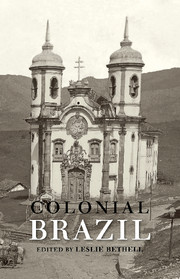Book contents
- Frontmatter
- Contents
- List of maps and figures
- Note on currency and measurement
- Preface
- 1 Portuguese settlement, 1500–1580
- 2 Political and economic structures of empire, 1580–1750
- 3 Plantations and peripheries, c. 1580 – c. 1750
- 4 Indians and the frontier
- 5 The gold cycle, c. 1690–1750
- 6 Imperial re-organization, 1750–1808
- 7 Late colonial Brazil, 1750–1808
- A note on literature and intellectual life
- Bibliographical essays
- Index
4 - Indians and the frontier
Published online by Cambridge University Press: 05 June 2012
- Frontmatter
- Contents
- List of maps and figures
- Note on currency and measurement
- Preface
- 1 Portuguese settlement, 1500–1580
- 2 Political and economic structures of empire, 1580–1750
- 3 Plantations and peripheries, c. 1580 – c. 1750
- 4 Indians and the frontier
- 5 The gold cycle, c. 1690–1750
- 6 Imperial re-organization, 1750–1808
- 7 Late colonial Brazil, 1750–1808
- A note on literature and intellectual life
- Bibliographical essays
- Index
Summary
The ‘frontier’ in this chapter is the European boundary, the limit of colonial expansion into Brazil. Each of the hundreds of native American tribes also had its own frontier, sometimes fluid and shifting but more often geographically defined and well known to every member of the tribe. Tribal frontiers were the boundaries between often hostile, warring groups, or were the limits of each people's hunting forays or annual collecting cycle. The European frontier was a sharper division: the limit of penetration or permanent occupation by an alien culture. It marked a divide between peoples of radically different racial, ethnic, religious, political and technological composition. To European colonists, the frontier was the edge of civilization. Beyond it lay the barbaric unknown of the sertão – the ‘wilds’, the bush or the wasteland of the interior – or the impenetrable selva, the Amazonian rain forests.
In practice, the frontier was less precise than it may have been in the colonists' perception. The men who explored, exploited or attacked the frontier were often mamelucos of mixed European and Indian blood. Many of them spoke Tupi-Guaraní or other Indian languages. They were almost invariably accompanied by Indian guides, auxiliaries or forced labourers, and they adopted efficient Indian methods of travel and survival. Even when European colonists were firmly established on conquered tribal lands, the frontier was not necessarily the boundary between civilization and barbarism. It was often the Indians beyond the frontier who were more civilized.
- Type
- Chapter
- Information
- Colonial Brazil , pp. 145 - 189Publisher: Cambridge University PressPrint publication year: 1987
- 12
- Cited by



